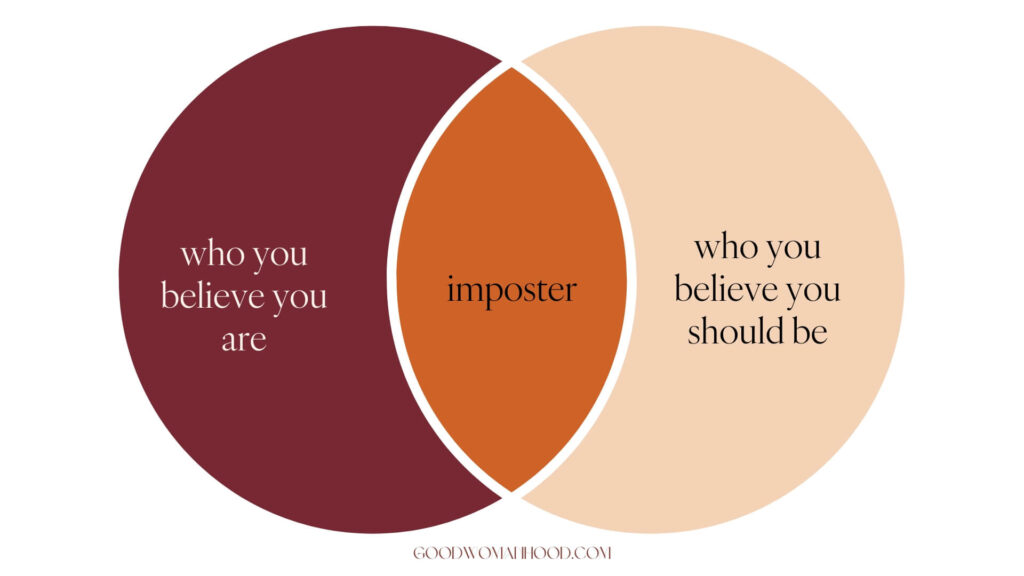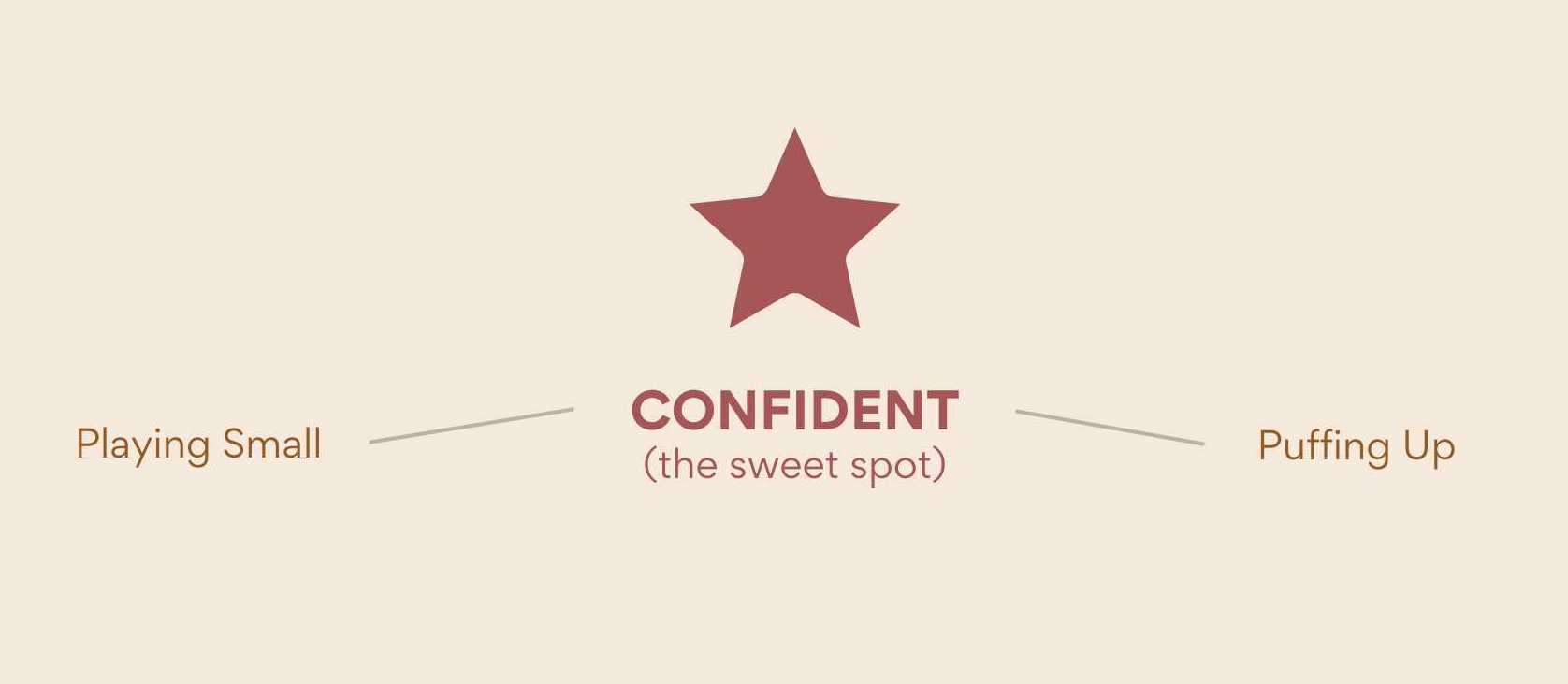Let’s talk about something that sneaks around our minds more often than it should: imposter syndrome. That nagging feeling that we don’t belong, that we’re not good enough, and that any minute now someone will call us out as frauds. Sound familiar? Trust me, you’re not alone. What is imposter syndrome, why is it so common among women, and most importantly, how can you kick it to the curb?
What is Imposter Syndrome?
Imposter syndrome is a feeling of inadequacy and self-doubt that makes you believe you’re not as competent as others perceive you to be. It feels like you’re wearing a mask, and sooner or later, someone’s going to rip it off and reveal that you’re just winging it. Psychologists first identified this phenomenon in the 1970s and it is a real thing.
The Upside Of the Imposter
Almost every high-performer woman that I know has an imposter horror story.
Being a woman in a male-dominated space is hard enough but feeling like The Only One (in any space) can be lonely and unbearable. Especially if the voice in your head tells you that you are not enough. Feeling like a fraud will fuel overwhelm, burnout, and an acute lack of satisfaction.
It will hold you back.
Feeling like an imposter, or fraud, is actually a gift. Yes, a gift.
You Are Not Alone
Most high-performers suffer from feeling like an imposter. From Maya Angelou, the famous poet and author, to All-Star WNBA player Monique Currie. Many amazingly successful people who show up powerfully in the world often wonder if they deserve their success – in fact, they often seriously doubt that they deserve it and secretly hope that no one finds out. So, if you are feeling like an imposter, you are in good company all around the world.
In fact, feeling like an imposter is a signal that you aim high and perform high.
The truth is that the inner imposter creeps up when you are:
- stepping up to lead
- doing something new and unfamiliar
- leaning into your edge
- letting others see you in a new way or role
- telling others about your truest dreams and desires
So, if you are feeling like a fraud, then you are probably a high-performing leader and what you are experiencing is very normal.
Before you say, “I’m not a leader” or “I’m not a high-performer”, let me just tell you that most imposters respond similarly. I’ve said it myself many times! And I’m a pretty high performer although it took some deep inner work on myself to acknowledge that without feeling guilty.
The gift of feeling like an imposter is:
- a natural by-product of a high-performing quality and
- one of your intrinsic drivers that pushes you towards excellence.
Why Do Women Feel This Way?
There are a few reasons why imposter syndrome seems to hit women particularly hard:
1. Societal Expectations
From a young age, women are often conditioned to be humble, polite, and not to outshine others. This can lead to internalizing the belief that we shouldn’t take up too much space or celebrate our achievements too loudly.
2. Representation
Seeing fewer women in leadership roles or in certain fields can make us feel like we’re anomalies rather than belonging where we are. When there aren’t enough role models, it’s easy to question if you’re truly fit for the role.
3. Perfectionism
Women often face pressure to be perfect in multiple areas of life—career, family, social circles. This perfectionism can fuel the belief that anything less than perfect is failure.
How to Tackle Imposter Syndrome
Let’s get into the strategies that will help you banish imposter syndrome and step into your true power.
1. Acknowledge Your Feelings
The first step in overcoming imposter syndrome is recognizing it. When you start feeling those doubts creeping in, don’t push them away. Acknowledge them, understand that they’re a part of you, but not all of you. Remember, even the most successful people have these feelings.
One Common Feeling That Fuels Imposter

When you believe that you are supposed to know more than you do, have more than you do, show up differently from how you do – especially because of what you think others expect – that is where feeling like an imposter lives. It makes us hustle to prove that we deserve our spot when, in fact, we already own our spot. We just don’t believe that “should” have it. That is a mind-trash game that fuels feeling like an imposter. It is a belief that begs to be checked because feeling like an imposter can rob you of your power to perform authentically and it can degrade your experience – even if you are doing something that you love.
So, when you find yourself feeling like an imposter, take a deep breath and say: “I deserve a better experience.”
2. Reframe Your Thoughts
Instead of thinking, “I don’t belong here,” try reframing it to, “I earned my place here.” Confidence isn’t about already having all the answers—it’s about trusting that you’ll figure things out.
3. Keep a Praise Journal
Start jotting down your accomplishments and positive feedback you receive. It doesn’t matter how small they seem. Over time, this journal will become a tangible reminder of your accomplishments. Whenever imposter syndrome strikes, flip through your journal for a boost.
4. Talk About It
Share your feelings with friends, mentors, or a coach. You’d be surprised how many people experience the same thing. Discussing your feelings can help you see them in a new light and gain support from others. Brené Brown’s book “Daring Greatly” is an excellent read on vulnerability and the importance of sharing your true self.
5. Set Realistic Goals
Break your goals into smaller, manageable steps. This can prevent the overwhelming feeling of having to achieve everything perfectly right away. Celebrate each small victory along the way. Progress is progress, no matter how small.
6. Embrace Failure
In the famous words of Nelson Mandela, “I either win or I learn.” Failure is not the opposite of success; it’s a part of it. Each time you fail, you learn something new. Instead of fearing failure, see it as an opportunity to grow. Elizabeth Day’s book “How to Fail” is a fantastic read that celebrates the lessons we learn from failing.
7. Find A Mentor or Coach
Finding a mentor who has walked the path before you can be incredibly validating. They can offer guidance, share their own experiences with imposter syndrome, and provide advice.
Conversely, a coach can help you execute on your goals, define and clarify your desired experience, and develop practices that you will serve you when you feel stuck.
8. Limit Comparison
Theodore Roosevelt said it best: “Comparison is the thief of joy.” With social media showcasing everyone’s highlight reel, it’s easy to fall into the comparison trap. Remember, people often share their successes, not their struggles. Focus on your own journey and celebrate your unique achievements.
9. Educate Yourself
Knowledge is power. The more you know about imposter syndrome, the better equipped you’ll be to handle it.
10. Practice Self-Compassion
Be kind to yourself. You’re doing your best, and that’s enough. Kristen Neff’s work on self-compassion is a great resource. Her book “Self-Compassion: The Proven Power of Being Kind to Yourself” provides practical advice on how to be gentler with yourself.
11. Be Radically Honest
Be radically honest about:
- who you are
- who you are not
- what you know
- what you don’t know (yet)
When your inner imposter shows up, acknowledge the feeling. If this is difficult, then I highly recommend getting a coach and support to help you work through the mind-trash that will hold you back. In women’s the confidence course we work on installing core beliefs that empower you because feelings are powerful guides to truth. It is so important to avoid trying to hide from your feelings or run from them or “push past them”.
12. Ask For Help
Since feelings are guides, instead of suffering in silence and feeling disempowered, you can say: “Thank you, Imposter! I know that you are here to guide me!”
What help do you need to ask for?
If asking for help is very difficult for you, then this is a very powerful shift that I invite you to make. As a connected, social human, asking for help is critical to survival and to happiness. We are designed to need support and to feel supported.
Confidence: The Sweet Spot
There is hope. The alternative to feeling like an imposter is to feel confident.

Confidence comes from the Latin word cõnfïdere (con– completely + fidere to trust), meaning to have full trust. The sweet spot of confidence is knowing who you are, what you bring to the table, where you need support, and trusting yourself to figure things out.
Confidence sits on the delicate middle ground between playing small, or taking up less than your rightful space, and puffing up by taking up more than your rightful space (usually in an attempt to influence how others think of you).
Playing Small vs. Puffing Up
You probably know what playing small feels like in the body. It feels like shrinkage, an urge to hide, to get lost in your phone, to avoid an uncomfortable situation, to stand against the wall, and avoid a seat at the table.
You’ve probably seen someone puffing up. The chest is out, the voice is raised, they seem to have all the answers – even if no one asked them a question, and they relish in being the hero to save the day.
Confidence is a Result, Not a Requisite
One sneaky misconception about confidence is that you need it to begin. But, the opposite is actually true! Don’t expect to feel confident at the start of doing something new or scary. Confidence comes as a result of “doing it scared” enough times to overcome the fear of failure. You need time to develop proficiency and experience. Most importantly, you need time to learn.
So, allow yourself to be a beginner without judgment. By practicing patience and granting yourself grace, you will naturally find your way to feeling confident.
Final Thoughts
Imposter syndrome might be a part of your journey, but it doesn’t have to define you. By acknowledging it, reframing your thoughts, and using practical strategies to combat it, you can step into your power with confidence. Remember, you’re not an imposter. You are either winning or learning: both are beautiful things!
So next time you feel like a fraud, take a deep breath, look in the mirror, and remind yourself: You’re exactly where you’re supposed to be. And if you need a little extra support, dive into some of the recommended readings and resources.
Auxiliary Reading Material:

12 Questions Worth
Asking When You
Feel Stuck
A Journaling invitation